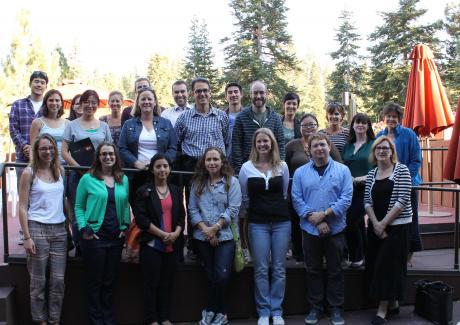New Legislative Caucus Seeks to End Poverty in California
February 12, 2014
SACRAMENTO, Calif. — Center for Poverty Research Director Ann Huff Stevens presented on poverty in California at the first meeting of the new legislative caucus on ending poverty in the state.
The EPIC Caucus (Ending Poverty and Inequality in California) meeting took place on February 12, 2014. Their goal of the caucus is to reduce the number of people who live in poverty in the state and to increase economic opportunity for all Californians. The 31-member caucus includes both Democrats and Republicans, as well as Senate President proTem Darrell Steinberg. The caucus is co-chaired by Senator Mark DeSaulnier and Assemblymember Mark Stone.
“You’ll see that especially during times of recession that the poverty rate in California swings higher than the national average,” said Stevens.
Stevens’ presentation focused on labor markets, which is her area of research. California faces unique challenges, she said, considering the state’s income inequality and how that contributes to an especially high poverty rate compared to other states.
A November report from the U.S. Census Bureau found California to have the highest poverty in the nation at over 23 percent when using the supplemental poverty measure. The supplemental measure takes into account housing and other costs as well as safety net program benefits. At 8.3 percent unemployment in December, California ranked ahead of only four states.
“We have all the problems of poverty, such as high costs and low wages, but also very high housing costs,” said Stevens.
Stevens was one of three presenters at the meeting. David Grusky, Director of the Stanford Center on Poverty and Inequality, and Mark Baldassare, CEO of the Public Policy Institute of California (PPIC) also presented their findings on poverty in California.
“It’s not just a poverty story, it’s an income inequality story. We have lots of it,” said Grusky.
Grusky said it was important to address the problems that cause poverty rather than focus on its effects. “We have a jobs disaster in California,” he said. “It’s people at the bottom of the skills hierarchy who are bearing the brunt of this jobs disaster.”
Additionally, he said, the state must do better in primary and secondary education, which can have an impact on higher education and the low-skilled labor market.
Baldassare said, “If we don’t do something about poverty and inequality today, we won’t have the California we all want in the future.”
PPIC has conducted polls on poverty in the state, and the findings show considerable support for the EPIC Caucus. “About half of Californians say the government should do more to make sure everyone has equal opportunity,” said Baldassare.
Attending lawmakers talked in terms of investment to solve poverty in California. “We need to be looking at where and how we’re going to reinvest,” said Senator Noreen Evans. “We need to think in terms of reinvestment.”
Caucus Co-chair DeSaulnier said partnerships between lawmakers and researchers will be important in developing policy to fight poverty in the state.
“We do want to look at the research and see what measures may be good investments,” said DeSaulnier.
DeSaulnier also stressed the urgency for affordable housing after the dissolution of California redevelopment agencies in 2012. The prior Community Redevelopment Law, passed in 1951 to redevelop blighted areas, generated $1 billion annually to fund affordable housing projects. According to the Department of Finance, those funds are now being used to pay required payments on existing bonds, other obligations and pass-through payments to local governments.
Last year, DeSaulnier introduced SB 391, which would levy funds from real estate recording fees to support affordable housing development. Co-authored with a handful of legislators in the EPIC Caucus, it would also require the monitoring and enforcement of prevailing wage requirements on projects over $1 million that are at least in part funded by the bill.
Stevens also said that while investments in labor markets are important, there is evidence about how critical existing safety net programs are for those who cannot work, especially children. A growing body of research shows the problems that living under the constant stress of poverty can cause, including neurological changes in a child’s developing brain.
“We better have a safety net if we want to think about the next generation,” said Stevens.










